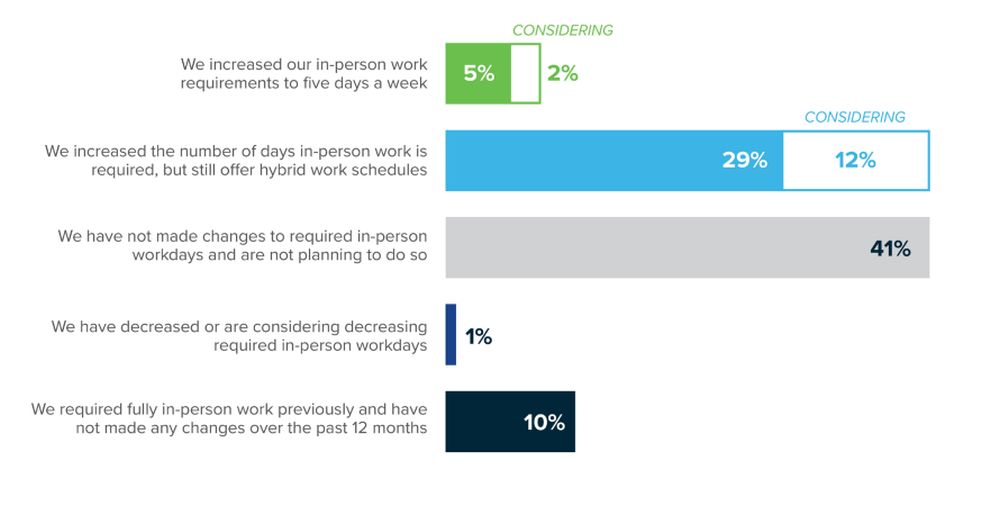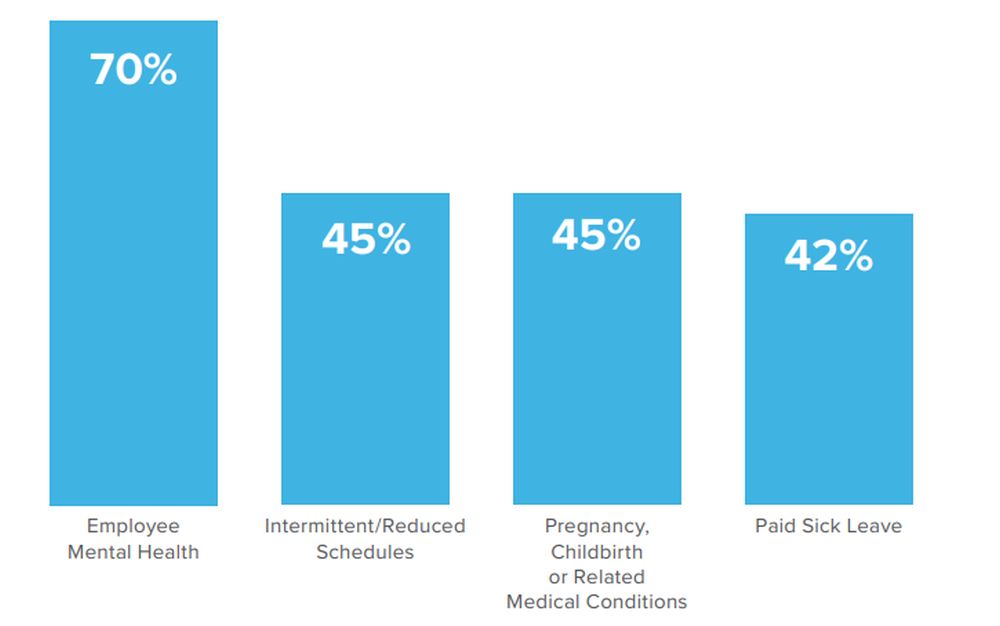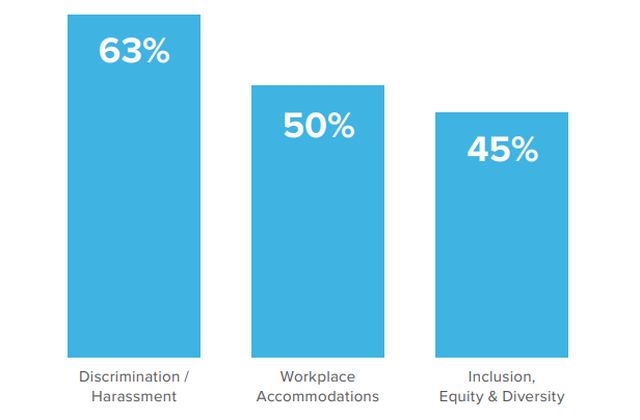- within Employment and HR topic(s)
- within Transport and Real Estate and Construction topic(s)
- with Senior Company Executives, HR and Inhouse Counsel
- in European Union
Employee requests for accommodations and leaves of absence are on the rise, marking a persistent cultural shift spurred by the COVID-19 pandemic, return-to-office mandates, and reduced stigma surrounding mental health conditions.
The practical and legal challenges facing employers amidst an evolving leave and accommodations landscape was among the issues analyzed in Littler's 2025 Annual Employer Survey Report, released in May and completed by nearly 350 executives across the U.S. This report provides a snapshot of key survey findings in this area.
RENEWED PUSH FOR IN-OFFICE WORK
Which of the following best describes any changes your organization has made over the past 12 months to the number of days that employees are required to work in person at a fixed worksite or office?

More than five years after the pandemic forced a paradigm shift in workplace norms, many employers are once again (or in some cases, still) making a concerted push for in-person work.
Nearly half of respondents whose organizations have positions that can be performed remotely said they have increased in-person work requirements over the past 12 months or were considering doing so. Most are focused on increasing the number of required in-person workdays within their hybrid schedules, with 29% having already done so and 12% considering such a change. Five percent of employers surveyed have gone even further and returned to in-person work five days a week—joining the 10% who are already requiring fully in-person work. Large organizations (those with more than 10,000 employees) appear to be even more concentrated on in-person work, with 47% saying they are increasing or planning to increase the number of such days within their hybrid schedules (compared with 41% overall).
ACCOMMODATION REQUESTS ON THE RISE
As plans to increase in-office work advance, employee accommodation requests are also rising, often related to remote work or employee mental health.
Remote Work

Among survey respondents whose organizations have increased their in-person work requirements, more than half (56%) and 65% of large employers have seen increased requests for remote work accommodations. Managing such requests requires companies to understand their legal obligations and insights from recent court cases in order to evaluate accommodation requests under the Americans with Disabilities Act (ADA), Pregnant Workers Fairness Act (PWFA) and/or similar state or local laws.
"The pandemic not only led to a fundamental transformation in employees' expectations for remote work, but it changed the way the people view the essentiality of in-person work. For companies looking to increase in-office work, it's important to have a plan in place for the likely influx of remote work requests. In managing these requests and communicating processes, it's also important to distinguish between legal obligations to provide reasonable accommodations to employees with disabilities under the ADA or PWFA—such as mental or physical health conditions—and employee requests for flexibility for other personal reasons that do not involve a legally binding accommodation obligation."
Alexis
C. Knapp
Co-Chair of Littler's Leave and Accommodation Practice
Group
Employee Mental Health
Top four areas in which respondents have received increased requests for leaves of absences and/or accommodations over the past year

Amid the ongoing focus on mental health in the workplace, the majority of respondents (70%) are seeing increased requests for leaves of absences and/or accommodations related to mental health conditions. This builds on the already high percentage of employers (74%) who were seeing an increased volume of such requests in Littler's 2024 Employer Survey.
Evaluating mental health-related requests poses unique challenges for employers, especially when these situations overlap with employee relations or performance issues. The stakes are also high. Missteps can leave companies vulnerable to litigation, and courts and agencies continue to expand the definition of a "reasonable accommodation." While each request comes with its own set of considerations, employers can focus on putting processes in place to promptly address requests and work with employees and their health care providers to determine whether reasonable accommodations can be made under the ADA or other laws, and/or whether employees are eligible for job-protected leave under the Family and Medical Leave Act (FMLA).
"It's clear that mental health remains a serious problem impacting the American workforce, as requests for accommodations and leaves of absence continue to rise dramatically year after year, and the health care system as a whole is under stress. Employers must anticipate and address these challenges, which are not going away any time soon."
Devjani H.
Mishra
Littler shareholder
Intermittent and Reduced Schedule Leaves
A large share of respondents also noted increases in requests for intermittent or reduced schedule leaves (45%). These types of leaves are often requested by employees who have chronic health conditions, such as migraines or back pain, that are episodic in nature and can come without much notice.
"Requests for intermittent or reduced schedule leaves involves a unique set of considerations that can be particularly difficult for businesses to manage. Challenges range from determining whether the FMLA applies to specific requests – or even particular dates within a request – to training managers on what questions they should and shouldn't ask to how to maintain adequate staffing and operations when absences are unpredictable."
Jeff
Nowak
Co-Chair of Littler's Leave and Accommodation Practice
Group
LITIGATION CONCERNS
Top three areas in which respondents expect employment-related litigation over the next 12 months

Amid an influx of employee accommodation requests, it follows that half of the survey respondents expressed concern about lawsuits related to workplace accommodations over the next year. The level of concern rose further among large employers (61%) and those in the manufacturing sector (62%).
The content of this article is intended to provide a general guide to the subject matter. Specialist advice should be sought about your specific circumstances.
[View Source]



